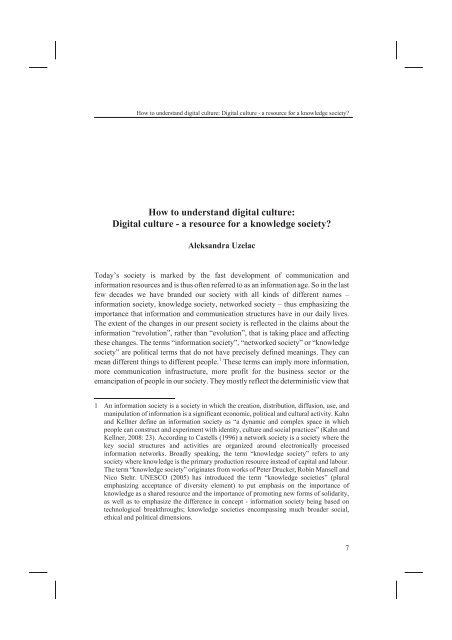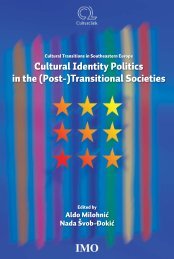D:\Documents and Settings\Ana\My Documents\Biserka-knjiga ...
D:\Documents and Settings\Ana\My Documents\Biserka-knjiga ...
D:\Documents and Settings\Ana\My Documents\Biserka-knjiga ...
Create successful ePaper yourself
Turn your PDF publications into a flip-book with our unique Google optimized e-Paper software.
How to underst<strong>and</strong> digital culture: Digital culture - a resource for a knowledge society?<br />
How to underst<strong>and</strong> digital culture:<br />
Digital culture - a resource for a knowledge society?<br />
Aleks<strong>and</strong>ra Uzelac<br />
Today’s society is marked by the fast development of communication <strong>and</strong><br />
information resources <strong>and</strong> is thus often referred to as an information age. So in the last<br />
few decades we have br<strong>and</strong>ed our society with all kinds of different names –<br />
information society, knowledge society, networked society – thus emphasizing the<br />
importance that information <strong>and</strong> communication structures have in our daily lives.<br />
The extent of the changes in our present society is reflected in the claims about the<br />
information “revolution”, rather than “evolution”, that is taking place <strong>and</strong> affecting<br />
these changes. The terms “information society”, “networked society” or “knowledge<br />
society” are political terms that do not have precisely defined meanings. They can<br />
mean different things to different people. 1 These terms can imply more information,<br />
more communication infrastructure, more profit for the business sector or the<br />
emancipation of people in our society. They mostly reflect the deterministic view that<br />
1 An information society is a society in which the creation, distribution, diffusion, use, <strong>and</strong><br />
manipulation of information is a significant economic, political <strong>and</strong> cultural activity. Kahn<br />
<strong>and</strong> Kellner define an information society as “a dynamic <strong>and</strong> complex space in which<br />
people can construct <strong>and</strong> experiment with identity, culture <strong>and</strong> social practices” (Kahn <strong>and</strong><br />
Kellner, 2008: 23). According to Castells (1996) a network society is a society where the<br />
key social structures <strong>and</strong> activities are organized around electronically processed<br />
information networks. Broadly speaking, the term “knowledge society” refers to any<br />
society where knowledge is the primary production resource instead of capital <strong>and</strong> labour.<br />
The term “knowledge society” originates from works of Peter Drucker, Robin Mansell <strong>and</strong><br />
Nico Stehr. UNESCO (2005) has introduced the term “knowledge societies” (plural<br />
emphasizing acceptance of diversity element) to put emphasis on the importance of<br />
knowledge as a shared resource <strong>and</strong> the importance of promoting new forms of solidarity,<br />
as well as to emphasize the difference in concept - information society being based on<br />
technological breakthroughs; knowledge societies encompassing much broader social,<br />
ethical <strong>and</strong> political dimensions.<br />
7



